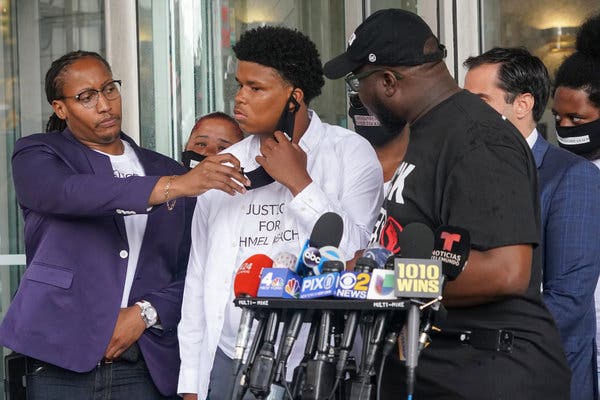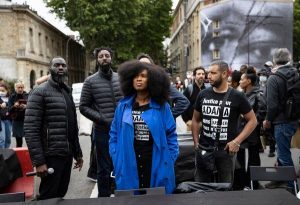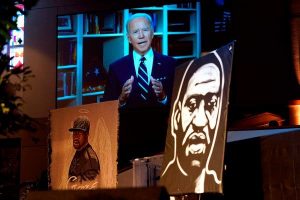Weather: Sunny, with a high in the mid-80s. Over the weekend: More sun, but a good bit cooler.
Alternate-side parking: Suspended through June 21.
A photo shows a long, bloody laceration running down the right side of Jahmel Leach’s face, from cheek to chin. The skin around the injury is swollen.
His family and the police agree that officers hit Jahmel, 16, with a stun gun during a protest in the Bronx on June 1, but they have given different accounts of what led to the incident.
Jahmel was watching the protest when, according to his family members, police officers beat him and used a Taser on him, and then took him into custody. At a news conference on Thursday, the Rev. Kevin McCall, speaking on Jahmel’s behalf, said, “He didn’t break the law at all.”
Two police officials, however, said that officers had shocked Jahmel to stop him from setting fires. The officials spoke on the condition of anonymity because the investigation was continuing.
The Bronx district attorney’s office, the New York Police Department and the Civilian Complaint Review Board are all investigating the matter.
For the moment, Jahmel’s case is the latest piece of evidence for critics who charge that the New York police have used unnecessary force against some people during the protests against police brutality. Mayor Bill de Blasio said on Thursday that he had met with Jahmel and his family, and he told reporters he was “very concerned” by the allegation of misconduct.
[Injuries to a teenager during a protest arrest are under investigation.]
In other protest news:
No one emerged as the clear leader of the protests.
Over the past two weeks, a relatively new cadre of activists has been organizing the marches and gatherings: One is a former financial adviser. Another is a makeup artist. One is a college student who, until the pandemic, worked at a movie theater.
City officials seem to be listening to some of the protesters’ demands. Mr. de Blasio and others have said they are weighing cuts to the Police Department’s budget, more funding for youth and community programs, and an overhaul of how police misconduct allegations are handled.
[How the New York protest leaders are taking on the establishment.]
A debate is reignited over spaces honoring Confederate leaders.
Fort Hamilton Army base in Brooklyn includes streets named after two Confederate generals, Robert E. Lee and Thomas J. “Stonewall” Jackson, and local officials are urging the military to rename them.
At a news briefing on Thursday, Mr. de Blasio said that “nothing should be named after Robert E. Lee at this point in history.”
The mayor’s remarks followed a letter sent by Max Rose and Yvette D. Clarke, congressional Democrats who represent parts of Brooklyn, to Defense Secretary Mark T. Esper that called for renaming the streets, which are overseen by the military and not by local officials.
The Pentagon said it was considering renaming 10 Army bases named for Confederate officers. President Trump has criticized the idea.
[A New York street is named for Robert E. Lee. Officials want that changed.]
Activists hope for a new face to be Democrats’ choice for mayor.
“When I say ‘mayor,’ you say ‘Jumaane,’” Linda Sarsour, a prominent activist, said to hundreds of people before they marched across the Brooklyn Bridge this week. She was referring to Jumaane Williams, the city’s public advocate.
Ms. Sarsour and other protesters seem eager to support a candidate who is outspoken on police reform, as Mr. Williams is, when New York City Democrats nominate their contender for mayor a year from now.
Mr. Williams, however, said in an interview that he was “very happy” with his current job.
Standing nearby when Ms. Sarsour led the chant was Brooklyn Borough President Eric Adams, a former police captain and the most prominent black mayoral candidate.
[Protests upend the mayor’s race, and eyes turn to Jumaane Williams.]
From The Times
A School Admissions Process That Caused Segregation Fell Apart in Weeks
Hotels Transformed New York’s Social Life. Now What?
A Master Storyteller’s Advice for Graduates: ‘Be Brave. Be Kind.’
Black and Latino Churches Offer Prayers, Hope and Coronavirus Testing
Want more news? Check out our full coverage.
The Mini Crossword: Here is today’s puzzle.
What we’re reading
A police lieutenant in Manhattan apologized for taking a knee at a May 31 protest. [New York Post]
Here’s how independent movie theaters are preparing to reopen. [Gothamist]
What we’re watching: J. David Goodman, Jeff Mays and Matthew Haag, all Metro reporters at The Times, discuss New York City’s partial reopening on “The New York Times Close Up With Sam Roberts.” The show airs on Friday at 8 p.m., Saturday at 1:30 p.m. and Sunday at 12:30 p.m. [CUNY TV]
And finally: A virtual social weekend
The Times’s Melissa Guerrero writes:
Although most performance spaces, museums and community centers are closed, people are finding creative ways to connect through virtual events and programs. Here are suggestions for maintaining a New York social life this weekend while keeping a safe distance from other people.
Genevieve Hudson: ‘Boys of Alabama’
Join Ms. Hudson, the author of “Boys of Alabama,” as she discusses the novel with her fellow author Paul Lisicky in a live book talk on Friday at 7 p.m.
Access the livestream on the Books Are Magic event page.
Sábado Familiar: Puerto Rican Day edition
On Saturday at 11 a.m., dance and learn about the Afro-Puerto Rican rhythm genres bomba and plena with the performance ensemble Los Pleneros de la 21. This Puerto Rican Day celebration is part of El Museo en tu Casa, a digital initiative by El Museo del Barrio that explores Latino art and culture.
Go to El Museo’s Facebook page for the livestream.
We Are Here: A Celebration of Resilience, Resistance and Hope
On Sunday at 2 p.m., musicians, actors and civic leaders hold a concert to commemorate the 75th anniversary of the end of World War II and the 77th anniversary of the Warsaw ghetto uprising. The event will include an interview with some of the filmmakers of “Who Will Write Our History.”
For the link to the livestream, visit the event page.
It’s Friday — get connected.
Metropolitan Diary: ‘Good morning’
Dear Diary:
I walked across the street from my apartment in Chelsea to grab breakfast at a bodega.
As I waited to order, the man behind the counter looked up at the woman in front of me.
“Good morning,” she said.
Without replying, he began to whip up a delicious-looking bacon, tomato and Swiss cheese omelet that he folded onto a golden croissant.
He wrapped up the sandwich, handed it to the woman and turned his eyes to me.
“I’ll have the Good Morning,” I said.
He gave me a blank, inquisitive look.
“I’ll have the Good Morning sandwich like that one you just made,” I said.
The counterman chuckled.
“That lady’s been coming in here for the last 10 years and orders the same thing every day,” he said.
— Rob Beck
New York Today is published weekdays around 6 a.m. Sign up here to get it by email. You can also find it at nytoday.com.
We’re experimenting with the format of New York Today. What would you like to see more (or less) of? Post a comment or email us: [email protected].



















